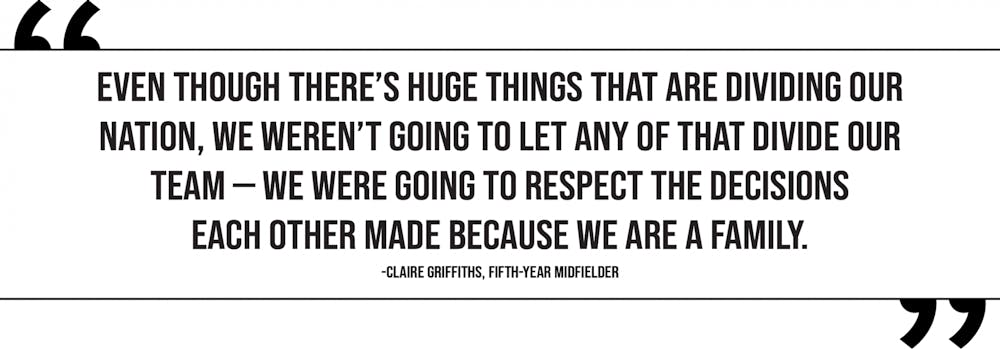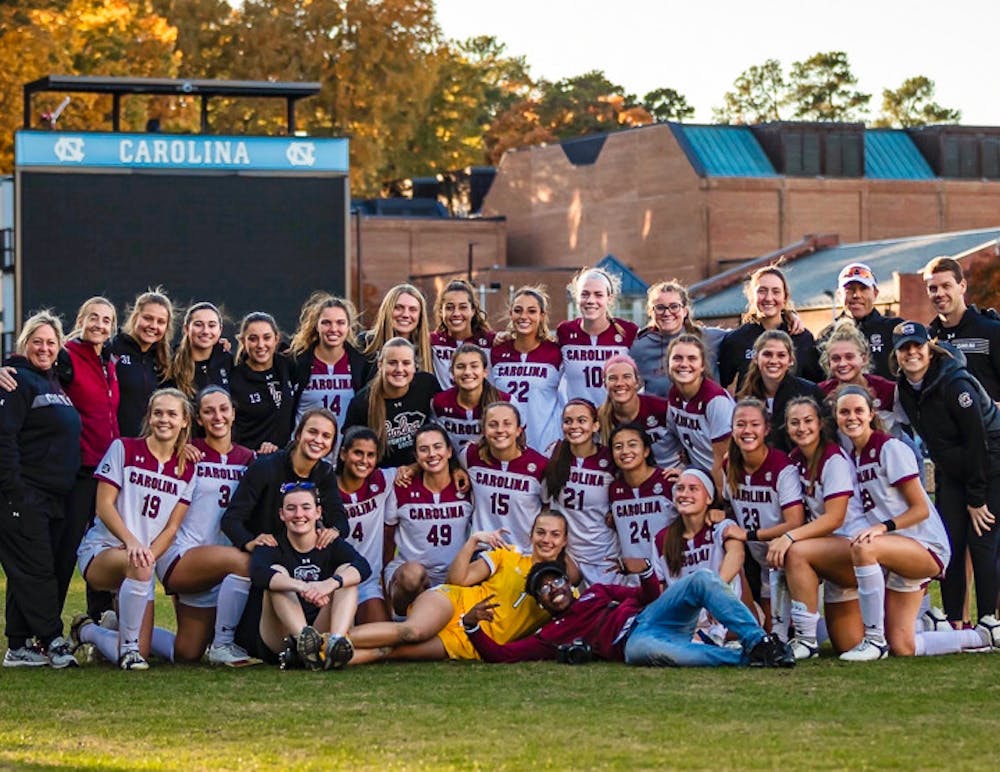Third-year sport and entertainment management student Abby Platt lives by a piece of advice her mother gave her at a young age while she grew up in a small New York town.
“‘I don’t care as long as you’re happy,'" her mother told her. "It was really nice growing up always having that voice being like, ‘I love you and I want you to be happy,’” Platt said.
That supportive environment has carried over from the Platt household onto the South Carolina women’s soccer team, where players strive to preach inclusivity and support teammates of all races and sexualities.
Platt, who works as a student manager for the team, and fifth-year midfielder Claire Griffiths — who are both part of the LGBTQIA+ community — discovered their sexualities at early ages.
Soccer served as an outlet for stress and a source of inspiration for the two of them.
“With the women’s national team, on any given day, there’s three to four, minimum, gay players on the team for people to look up with,” Platt said. “Ashlyn Harris and Ali Krieger met each other playing soccer and then got married a couple years ago and now have two kids. Seeing that it’s all possible within sports too is just really great … I saw that she was happy with what she was doing (and) her teammates supported her.”
Griffiths said she relied on her twin sister, the first person she came out to, to help her become more comfortable with herself and her sexuality.
“She’s straight, so she’s not a member of the LGBTQ+ community, but she was so loving and accepting, she encouraged me to be my true authentic self,” Griffiths said. “She was my ally whenever I did go home and tell extended family members or my parents. She was always my rock through it.”
Although she surrounded herself with supportive friends and family, Platt said one of the biggest internal conflicts she experienced before coming out was the Catholic Church's stance on the matter.
“It’s kinda drilled into your head from the very beginning of like what's right and what’s wrong, and then you find yourself being like, ‘Well, hey, that’s how I feel, but I’ve always been told that’s not really right,'" Platt said.
Griffiths cited navigating locker room dynamics as one of the mental roadblocks that made coming out even more difficult.
“I didn’t want to make any of my teammates feel uncomfortable because none of them were making me feel uncomfortable by any means," Griffiths said.
Despite these concerns, both Platt and Griffiths said their fears evaporated once they became members of the team, especially after interacting with other players. An interaction the two of them shared while watching presidential election coverage on television together during the 2020 season also helped relieve some internal tension.
“She made a joke about being like, “Yeah, I’m really worried that I’m not going to be able to get married after this election,’ and I was like, ‘Me too,’" Platt said. “And that’s the first person I told was Claire, and she was like, “Oh, cool, you too?’ That was kinda just it, like ‘Oh, sick, we’re both just watching the election worrying about our right to get married.'”
Griffiths said her teammates’ willingness to have conversations and comfort when talking about those topics to her brought an enhanced sense of belonging and togetherness.
“I’m willing to answer any of their questions because LGBTQ things are still taboo in a lot of communities,” Griffiths said. “So many times, ignorance is bliss, but they were so willing to understand what were things they could say versus what things they couldn’t, because they didn't want to cross a line.”
Redshirt senior midfielder Samantha Chang said she uses gender-neutral terms — like "partner" instead of "boyfriend" or "girlfriend" — and listens to her teammates to gain a new perspective.
“It’s important to appreciate people for who they are now, regardless of where they come from or what they’ve dealt with,” Chang said. “It is hard for anybody to come out … so I think it’s important just to hear people’s stories and understand that everybody goes through a different experience.”
Along with one-on-one conversations, the team frequently has group discussions about important issues to give players a platform to voice opinions and promote positive change.
“When we were all making a decision whether we were going to kneel or stand for the anthem, we had those conversations together because it’s important,” Griffiths said. “Even though there’s huge things that are dividing our nation, we weren’t going to let any of that divide our team — we were going to respect the decisions each other made because we are a family.”

Those words have turned into action in many ways, including the decision to put inclusive messaging on the team’s jerseys. Each uniform has a patch that reads "Matter is the minimum."
“While the LGBTQ community was not directly intertwined with it, it was seeing a really good unified front … (was) a good sign for everything else," Platt said.
After initially being worried about losing friends and family because of her decision, Griffiths said she has built an inclusive community with the team and has grown tremendously since she first came out.
“It’s a testament to the program we have and the type of players and the group of girls," Griffiths said.

